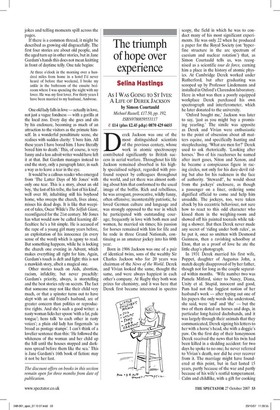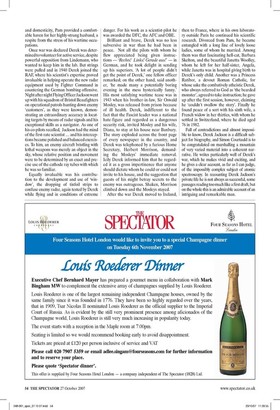The triumph of hope over experience
Selina Hastings AS I WAS GOING TO ST IVES: A LIFE OF DEREK JACKSON by Simon Courtauld Michael Russell, £17.50, pp. 192, ISBN9780859553117 £14 (plus £2.45 p&p) 0870 429 6655 Derek Jackson was one of the most distinguished scientists of the previous century, whose work in atomic spectroscopy contributed significantly to British success in aerial warfare. Throughout his life Jackson remained absorbed in his highly specialised subject, regarded with profound respect by colleagues throughout the world, and yet there was almost nothing about him that conformed to the usual image of the boffin. Rich and rebellious, he was arrogant, provocative, wildly funny, often offensive; incontestably patriotic, he loved German culture and language and was strongly opposed to the war in which he participated with outstanding courage; frequently in love with both men and women, he married six times; his passion for horses remained with him for life and he rode in three Grand Nationals, continuing as an amateur jockey into his 60th year.
Born in 1906 Jackson was one of a pair of identical twins, sons of the wealthy Sir Charles Jackson who for 20 years was chairman of the News of the World. Derek and Vivian looked the same, thought the same, and were always happiest in each other's company. At Rugby they both won prizes for chemistry, and it was here that Derek first became interested in spectro scopy, the field in which he was to conduct many of his most significant experiments. He was only 22 when he produced a paper for the Royal Society (on 'hyperfine structure in the arc spectrum of caesium and nuclear rotation') that, as Simon Courtauld tells us, was recognised as a scientific tour de force, earning him a place in the history of atomic physics. At Cambridge Derek worked under Rutherford, but after graduating was scooped up by Professor Lindemann and installed in Oxford's Clarendon laboratory. Here in what was then a poorly equipped workplace Derek purchased his own spectrograph and interferometer, which he later donated to the university.
'Oxford bought me,' Jackson was later to say, 'just as you might buy a promising yearling.' The simile was apposite as Derek and Vivian were enthusiastic to the point of obsession about all matters equine, and specifically hunting and steeplechasing. 'What are men for?' Derek used to ask rhetorically. 'Looking after horses.' Two of his racehorses he named after inert gases, Niton and Xenon, and he became a conspicuous figure in racing circles, not only for his dare-devil riding but also for his rudeness in the face of authority. 'Steward!', he would shout from the jockeys' enclosure, as though a passenger on a liner, ordering some dignified official to come and help him unsaddle. The jockeys, too, were taken aback by his eccentric behaviour, not sure how to react to this odd character who kissed them in the weighing-room and showed off his painted toenails while taking a shower. But then Derek never made any secret of 'riding under both rules', as he put it, once so smitten with Desmond Guinness, then a ravishing schoolboy at Eton, that as a proof of love he ate the little chap's photograph.
In 1931 Derek married his first wife, Poppet, daughter of Augustus John, a match deeply disapproved of by her father, though not for long as the couple separated within months. 'Wife number two was Pamela Mitford, sister to Nancy, Diana, Unity et al. Stupid, innocent and good, Pam had not the foggiest notion of her husband's work — after typing out one of his papers the only words she understood, she said, were 'and' and 'the' — but the two of them doted on horses and dogs, in particular long-haired dachshunds, and it was largely through their animals that they communicated, Derek signing his letters to her with a horse's head, she with a doggie's paw. On the first day of their honeymoon Derek received the news that his twin had been killed in a sledding accident: for two days he spoke to no one; he never referred to Vivian's death, nor did he ever recover from it. The marriage might have foundered at this point, but in fact lasted 15 years, partly because of the war and partly because of his wife's restful temperament. Calm and childlike, with a gift for cooking and domesticity, Pam provided a comfortable haven for her highly-strung husband, a respite from the stress of his wartime occupations.
Once war was declared Derek was determined to volunteer for active service, despite powerful opposition from Lindemann, who wanted to keep him in the lab. But strings were pulled and in 1940 Derek joined the RAF, where his scientist's expertise proved invaluable in helping operate the new radar equipment used by Fighter Command in countering the German bombing offensive. Night after night Flying Officer Jackson went up with his squadron of Bristol Beaufighters on operational patrols hunting down enemy 'customers', as they were known, demonstrating an extraordinary accuracy in locating targets by means of radar signals and his exceptional skills as a navigator. As one of his co-pilots recalled, Jackson had the mind of the first-rate scientist ... and his interceptions became polished and balanced exercises. To him, an enemy aircraft bristling with lethal weapons was merely an object in the sky, whose relative position and movement were to be determined by an exact and precise use of the cathode ray tubes with which he was so familiar.
Equally invaluable was his contribution to the development and use of 'window', the dropping of tinfoil strips to confuse enemy radar, again tested by Derek while flying and in conditions of extreme danger. For his work as a scientist-pilot he was awarded the DFC, the AFC and OBE.
Brilliant and brave, Derek was no less subversive in war than he had been in peace. Not all the pilots with whom he flew appreciated being given instructions — Rechts! Links! Gerade aus!' — in German, and he took delight in sending up his superiors. 'A lot of people didn't get the point of Derek,' one fellow officer remarked; on the other hand, said another, 'he made many a potentially boring evening in the mess hysterically funny.' His most satisfying wartime tease was in 1943 when his brother-in-law, Sir Oswald Mosley, was released from prison because of ill health. Derek, indifferent to the fact that the Fascist leader was a national hate-figure and regarded as a dangerous security risk, invited Mosley and his wife, Diana, to stay at his house near Banbury. The story exploded across the front page of every newspaper in the country, and Derek was telephoned by a furious Home Secretary, Herbert Morrison, demanding the Mosleys' immediate removal. Icily Derek informed him that he regarded it as a gross impertinence that anyone should dictate whom he could or could not invite to his house, and the suggestion that guests of his might betray secrets to the enemy was outrageous. Shaken, Morrison climbed down and the Mosleys stayed.
After the war Derek moved to Ireland, then to France, where in his own laboratory outside Paris he continued his scientific research. Divorced from Pam, he became entangled with a long line of lovely loose ladies, some of whom he married. Among them was that fascinating hell-cat, Barbara Skelton, and the beautiful Janetta Woolley, whom he left for her half-sister, Angela, while Janetta was in hospital giving birth to Derek's only child. Another was a Princess Ratibor, a devout Roman Catholic, for whose sake the combatively atheistic Derek, who always referred to God as `the bearded monster', agreed to take instruction; he gave up after the first session, however, claiming he 'couldn't swallow the story'. Finally he found peace of a sort with his sixth wife, a French widow in her thirties, with whom he settled in Switzerland, where he died aged 76 in 1982.
Full of contradictions and almost impossible to know, Derek Jackson is a difficult subject for biography, and Simon Courtauld is to be congratulated on marshalling a mountain of very varied material into a coherent narrative. He writes particularly well of Derek's war, which he makes vivid and exciting, and he gives a clear account, as far as I can judge, of the impossibly complex subject of atomic spectroscopy. In recounting Derek Jackson's private life he is not always as successful, some passages reading too much like a first draft, but on the whole this is an admirable account of an intriguing and remarkable man.



































































 Previous page
Previous page